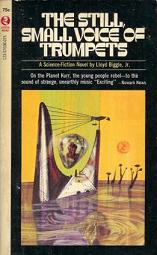
The Still, Small Voice of Trumpets
Lloyd Biggle
192 pages
published in 1968
I have mentioned before that Lloyd Biggle has long been one of my favourite writers; well, The Still, Small Voice of Trumpets is his best novel. I first read it in Dutch translation decades ago, then found the original some years ago and read it in English for the first time, which confirmed it was as good as I remembered. That was a while ago though and the danger with a second reread is that you'll be disappointed when it turns out you remembered a better book than the writer had written... Fortunately, this is not the case here. The Still, Small Voice of Trumpets is as good a book as I remembered.
What I like about Biggle in general and this book in particular is two things. First, Biggle is an unabashed, old fashioned optimistic American liberal. In all the novels I've read about him his optimism and belief in humankind shines through. In The Still, Small Voice of Trumpets this is especially present, as its background has a (galactic?) Federation of Independent Worlds, complete with a benevolent bureaucracy created to help prepare worlds outside this federation to reach a high enough democratic and technological level to become members themselves. All this however has to be done without the natives of such a world noticing they're being helped, as "democracy imposed from without is the severest form of tyranny". Sometimes this process goes quickly, sometimes more slowly and sometimes the process stalls completely, as is the case with the planet Gurnil, in which the kingdom of Kurr stubbornly refuses to be improved.
The second thing I like about Biggle is his eye for culture, as opposed to science and engineering, which is rare in what you might call "classic" science fiction, as created by John Campbell and his stable of Astounding writers. In The Still, Small Voice of Trumpets this aspect is covered by the hero, Jef Forzon, who isn't a member of the Interplanetary Relationships Bureau, the bureaucracy whose job it is to prepare planets for entry to the Federation, but a member of the Cultural Survey, whose job it is to catalog a planet's culture once it is admitted to the Federation. Forzon has been assigned to Gurnil as an emergency measure, to help jumpstart the democratisation process in Kurr again, as the IPR is getting somewhat desperate.
Though Forzon is expected to remain at the IPR base, he's impatient to get out of it and into Kurr itself, as he's fascinated by its obviously highly developed culture and it's not at all possible to study it from afar. Although coordinator Rastad -- who did not like the idea of a Cultural Survey man of all people being appointed over his head-- objects, in the end Forzon get's his wish and is dropped of at a remote spot near a IPR safehouse --straight into an ambush. Somebody has sold out the IPR and Forzon has his suspicions as to whom...
While Forzon is hustled from one place of dubious safety to another, he has barely time to think about the problem he was supposed to solve: how to end the tyranny of the kings of Kurr without outside interference and how to do this before the planet is reported as blown: aware that there are aliens meddling in its affairs. If that were to happen, the planet would be off limits for hundreds, if not thousands of years...
The problem is, the kings of Kurr have been far too smart to be too tyrannical: commerce and the arts prosper, the people are on the whole well fed and happy and the only real cruelty the king practises is tpo chop off the left hand or arm of anybody who offends him. Even then, the victims are given medical care and banished to live out the rest of their lives in special one-handed villages, out of sight of the rest of Kurr's population.
The Still, Small Voice of Trumpets is, in essence, a puzzle story of the kind popularised by Astounding/Analog. The hero has to solve a problem for which a neat solution exists, with the story being about finding this solution. But reducing this story to its essence would be somewhat unfair, because the pleasure in reading it lies not just in seeing the hero find a solution to his problems, but also in the world Biggle creates around the plot. Biggle had an eye for culture, something that was a bit rare in science fiction writers of his generation. What's more, it's not just colourful detail, it's central to the story. And the culture he creates for Kurr works, is recognisably alien if not so alien that it becomes incomprehensible.
Of course, some of the assumptions here don't hold up so well on reflection: the idea that the universe is full of planets so Earthlike that it's even possible to infiltrate their societies being the biggest one. You can also quibble with the central idea of "democracy imposed from without being the severest form of tyranny", though recent experiences in Afghanistan and Iraq hint that there is more than a kernel of truth in it. Nevertheless, the whole idea of virginial, unspoiled civilisations unconnected with the outside world that are gently massaged for entry into a benevolent Galactic Federation is rather ahistoric. But then again, what is science fiction but the realisation of the ahistoric and the implausible?
Read more about:
Lloyd Biggle,
The Still, Small Voices of Trumpets,
science fiction,
book review